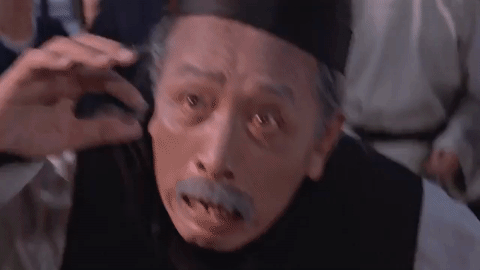#TrueTalkTuesdays 12
Being scared, anxious, or nervous before competition is natural and nearly every top competitor feels it.
A common question I get from newcomers to the competition scene is how I deal with pre-fight jitters.
Some of them even think something is wrong with them because they are nervous.
Relax, nearly EVERYONE is nervous to a certain degree. I have spoken to UFC, ADCC, IBJJF, and Bellator champions off the record and they all freely admit to being anxious before fights. One of them would even throw up before every fight just from the nerves.
Keep in mind, these are people who do this for a living and have tons of experience. So don’t worry too much about feeling stressed – pretty much everyone does.
The important question to ask is, “why are we stressed before competition?”
But before we answer that, we have to define stress. Stress is simply emotional energy. It usually has a negative connotation is our society, but that is just a misunderstanding. Stress can be either positive or negative, depending on how you perceive it. That is the important part, because two people can receive the same stress stimuli and have totally different reactions.
For example, imagine a pair of twins about to enter a roller coaster. Twin “A” LOVES going on rides and lives for the rush of the wind blowing by him, howling all the way through. Twin “B” is deathly afraid of heights and the crashing speeds a roller coaster brings. As a result, “A” is bouncing up and down before the roller coaster, with a big grin on his face as he gets ready for the ride. “B” is shaking in his boots, sweating profusely, and looking side to side for a way out. Once they enter the ride, “A” is shouting at the top of his lungs and laughing his way through the ride. “B” gets sick, closes his eyes, and prays to a higher power. At the end of the ride, “A” is ready to jump on another ride, while “B” throws up and curls into the fetal position.
These are twins, that are physically the same and went through the same external physical stress (the roller coaster), yet they experienced totally different emotions and as a result their bodies responded differently as well. This is the power of perception and emotions. One person’s dream can be another person’s nightmare.
In this case, “A” experienced the effects of positive stress. It motivated and excited him to enter the ride, and gave him a sense of accomplishment and happiness. “B” dreaded the ride, which caused him to experience fear and doubt. What separated the two of them was their perception of the roller coaster ride.
So when it comes to competing in BJJ or MMA, what could affect our perception of combat?
1. Competing in front of a large audience, friends, or family
When polled, more people are afraid of speaking in public than anything else. Imagine fighting in public?
Now what fuels this fear really though? Because people speak everyday, so why would speaking in front of 1 person versus 1,000,000 people make a difference? The main reason is that people fear judgement.
Usually in our day to day conversations we are speaking with people we know and trust, so we aren’t too concerned of saying something that would cause us to be viewed in a negative light. But when we speak in public, we are speaking to a group of complete strangers, and our first impression that we may give could cause us to be judged poorly – which could be a total disaster. At least that is what people think and fear – that they might reveal a chink in their armor and look foolish in front of EVERYONE.
People can also have this same type of fear in front of their friends or family, as they worry about “letting down their team” if they were to perform poorly.
So how do you conquer the fear of looking foolish in front of a large crowd or loved ones?
Simple, don’t care.
You compete for only one person – yourself. People like to fool themselves into thinking they do it for their team, their family, or some other altruistic motive. It makes them feel more noble and gives them additional motivation. But the reality is that it’s all for you. There are many ways to make a living, and fighting definitely is not the easiest way. People choose the fight path because they enjoy the challenge, the physical activity, and for proving to themselves they can do it. Yes it might end up supporting your family or friends, but even that is selfish. You enjoy being a provider and supporting the people around you.
That realization doesn’t it make it any less noble. What it does is reduce the perceived level of stress. Instead of having to impress millions of people, you just have to impress one – yourself. If you can deal with a loss on your own and become better for it, that’s all that matters.
2. Competing in unknown territory against an unknown opponent
The unknown is definitely scary, because it’s unknown. When most people compete in their first tournament, it is usually in a setting they have never been, against people they have never met. They have no idea what to expect, when they will fight, how their opponent will look like, what their skills are like, and so on.
All of these unknowns cause your mind to race in circles trying to guess what to expect. It’s like trying to solve this equation:
5x + 3y = z
They are to many variables here. There are infinite solutions to that equation: x could be 1, y could be 2, and z could be 11, or x could be 5, y could be -3, and z could be -16.
When trying to make sense of the future, infinite possibilities is troubling to say the least. So what can we do to “know” a little more about the future?
Live it.
Scout the arena beforehand, ideally during an event. That way you can experience the sights, smells, and sounds of the tournament. Watch how matches take place, the order they go in, how competitors enter the arena, etc. All of these things help make things “known” so your mind has a better picture of what to expect.
Other things to make known are how you are going to warm up, what you are going eat, and how you are going to rest. You should have a “ritual” of sorts, so that you know well in advance what you are going to do to warm up, eat, and rest before your match.
In regards to your opponent, there is only so much you can do. For most up and coming competitors, there is nothing you can really do to scout your competition. So don’t worry about it. Even if you did have video to study, the best thing you can do is once again – focus on yourself.
You want to fight your game, not your opponent’s. So implementing your game plan should be your main focus. What techniques are you going to use? What weak points do you have that you want to avoid or protect? These are the types of things you should focus on, as even if you could watch your opponent fight and “know” his style, what’s stopping him from completely changing his strategy to fight you?
Nothing. And that is why I focus on myself more than anything. It’s good to be aware of certain dangers an opponent may pose, but don’t base your whole game plan on it.
3. The Fear of Losing
Society has worked to create the image that losing is the worst thing possible. It’s not. Far from it. In fact, losing can become one of the most rewarding things you may ever do – if you have the right perception.
This fear of losing is somewhat tied into a fear of the unknown, as when you enter a match, there is no way of knowing with 100% objective certainty that you will win. There are so many variables in this equation, that the calculation is effectively impossible to have 100% certainty.
Some people think the big champions have no fear because they are undefeated or just an impressive fighter. I have found that sometimes these champions are more afraid, because they have so much more to lose. That fall from the peaks of greatness is much harder than falling from the bottom. 🙂
But really this fear is more about control – you do NOT decide if you win or lose.
What?
You don’t. There are referees and judges that make those decisions. You can knock someone out and get disqualified. Or a time keeper can call the round too soon. Perhaps judges do a terrible job and rob you.
At the end of the day, you do not ultimately have control if you win or lose. The only thing you do have control over is YOUR EFFORT.
This is what I tell competitors to focus on. It sounds easy to give it 100%, but in reality it is much more difficult. Doing everything in your power to win requires all of your courage and strength. That might mean pushing past exhaustion, getting your face smashed, arm broken, bleeding, and still fighting with everything you got. To fight at 100%, that also means you have to train at 100%, and we all know how hard that is. Maintaining a clean diet, being smart with training, putting in that roadwork.
All of these things YOU HAVE CONTROL over. So I forget the crowds, my team, my opponent, about winning or losing, and focus purely on my effort. How hard am I going to fight? What price am I willing to pay for victory?
Because I can assure you, if you give it everything you got, and have no regrets in your preparation, win, lose, or draw you will not be disappointed. That is why you can see great fighters go into 5 round wars, lose, and still be proud and smile.
Imagine I had a crystal ball and can see the future with 100% accuracy. I tell you in advance that you will lose your next fight just moments before entering the ring. My question to you: will you still fight?
For me, the answer is of course. I am not fighting to “win”, I’m fighting to prove to myself what I am capable of. If that means victory or defeat is besides the point.
As a result of how I perceive combat, I enter a fight with much less anxiety than most people. I haven’t entered combat with fear but rather with excitement. Those butterflies in your stomach are stress pushing you to action. When you do start feeling them build up, you want to get some exercise in though, as having prolonged stress without physical release will cause a build up of cortisol that will have a negative effect on your body.
So when you enter a tournament or match, the first thing you should do is get a warm up in early, way before you compete. This gets out all the jitters, breaks that first wind, and then refuel and rest. For the most part you should sleep or rest, not thinking about fighting whatsoever. If you can sleep all the way through wonderful. About 30 minutes or so before a match, I suggest doing another warm up, stretch, and get ready for the match. You want to enter a match ideally with some sweat on your brow and warmed up.
One thing that some people find assuring to know is that whatever you are feeling, your opponent is feeling too. They are human as well, and they sweat, bleed, cry, and stress out like everyone else. When you are competing, you can hear them breathe heavy too. So you are not alone. We all feel it, and as a coach, the moment you step on the mats you make us proud. Don’t worry about the outcome, just focus on the effort, because we are their to support YOU.
What do you think? Do you agree or disagree?
Comment with your take on this. And if you like this article, please do me a solid and share it with your friends. Thanks!




Great stuff ?? Oss!
Good article! Cheers
Thank you
That was just what I needed to read to give me the motivation I needed thank you
Glad to hear it 🙂